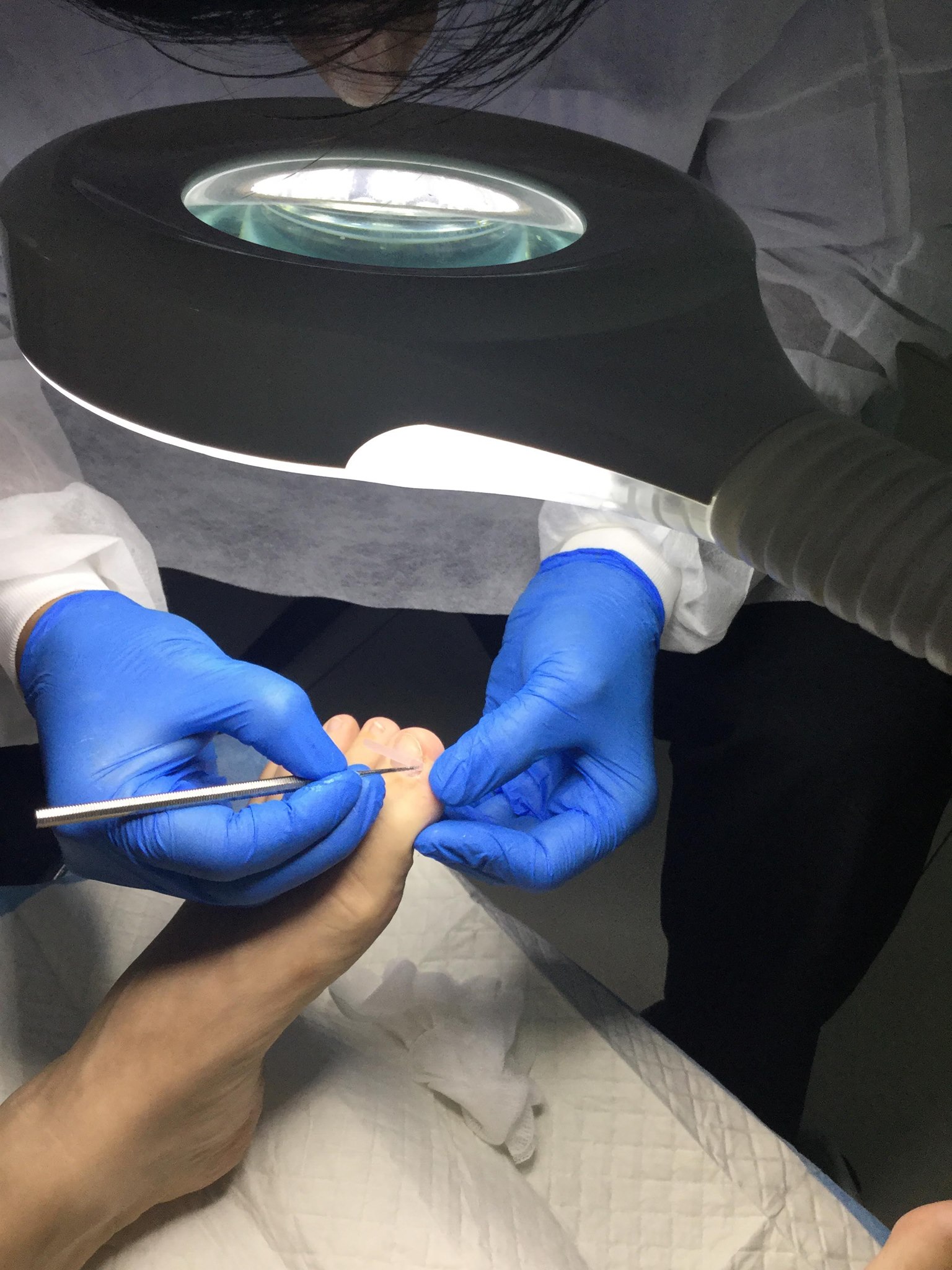Ingrown Nail Doctor Near Me Williams AZ
Do you know that feeling of having a sharp pain in your toe every time you wear shoes? Or the discomfort that comes with even the slightest touch to your toenail? If so, there is a high chance that you are suffering from an ingrown nail. This common foot condition affects millions of people every year and can be a source of constant discomfort and frustration. That’s why finding an ingrown nails doctor near you is crucial for effective treatment and relief. In this blog, we will discuss everything you need to know before visiting an ingrown nails doctor so that you can make informed decisions about your foot health. From the causes and symptoms of ingrown toenails to the different treatment options available, we’ve got you covered. So sit back, relax, and let’s dive into the world of ingrown nails and how you can find relief with the help of an expert near Williams AZ.
What is an Ingrown Nail?
An ingrown nail, also known as onychocryptosis, can be quite a painful and uncomfortable condition. It occurs when the edge of a toenail grows into the surrounding skin, potentially leading to infection if left untreated. While the big toe is the most common location for an ingrown nail, it can happen in any toe.
Improper trimming of the toenail is one of the main causes of this issue. When nails are cut too short or curved at the edges, they have a higher chance of growing into the skin instead of growing straight out. Other factors that can contribute to ingrown nails include wearing tight shoes that exert pressure on the toes and genetics, as some people may have nail shapes that make them more prone to this condition.
If you suspect that you have an ingrown nail, it is crucial to seek treatment. In the early stages, soaking the affected toe in warm water and gently lifting the edge of the nail can provide some relief. However, if you notice redness, swelling, or pus, it’s best to consult a doctor for proper treatment. Depending on the severity, treatment may involve removing the portion of the nail causing the issue, taking antibiotics if there is an infection, or in severe cases, removing the entire nail.
Prevention is key when it comes to ingrown nails. Taking proper care of your toenails by trimming them straight across and avoiding tight-fitting shoes can help reduce the risk of this condition. Remember, healthy and happy feet are essential for an active lifestyle.
Be mindful of how you trim your toenails and pay attention to any signs of an ingrown nail. By taking prompt action and adopting good foot care habits, you can keep your feet in tip-top shape and avoid the discomfort of ingrown nails.

Ingrown Nail Problem
What Causes Ingrown Nails
Improperly trimmed nails are a major cause of ingrown nails, as previously mentioned. However, there are several other factors that can contribute to this condition. Let’s explore them in more detail:
- Sweaty Feet: Excessive sweating can soften the skin around the toenails, making it easier for the nail to pierce it. To prevent this, ensure your feet stay dry and consider using talcum powder or antiperspirant.
- Poor Foot Hygiene: Neglecting to keep your feet clean and dry creates a breeding ground for bacteria, leading to infections that can contribute to ingrown nails. Make it a habit to wash and thoroughly dry your feet daily, paying attention to the areas around the nails.
- Diabetes or Poor Circulation: These conditions can impact the health of your feet, making them more susceptible to ingrown nails and other foot problems. It is crucial to manage these conditions properly and seek professional advice on foot care.
- Abnormal Nail Shape: Some individuals naturally have oddly shaped nails, which can increase the likelihood of ingrown nails. If you have this characteristic, taking extra care when trimming your nails is essential. Consider seeking advice from a podiatrist.
- Fungal or Nail Infections: Conditions such as fungal infections can cause changes in the shape and structure of the nails, making them more prone to becoming ingrown. Promptly treating any nail infections can help prevent complications.
It is crucial to be aware of these contributing factors and take necessary precautions to prevent ingrown nails. Regularly inspect your feet for any signs of an ingrown nail, such as redness, pain, or swelling. If you notice any symptoms, seek treatment early to avoid complications.
By maintaining proper foot hygiene, wearing well-fitting shoes, and trimming nails correctly, you can significantly reduce the risk of ingrown nails. Remember, healthy feet are happy feet!
Signs and Symptoms of Ingrown Nails
Recognizing the signs and symptoms of ingrown nails is crucial to prevent further complications. Let’s explore some common indicators that may help you identify if you have an ingrown nail:
- Pain and tenderness along the sides of the nail: If you notice discomfort or sensitivity when pressure is applied to the sides of the nail, it could be a sign of an ingrown nail.
- Redness and swelling around the toenail: An ingrown nail can cause the surrounding area to become inflamed, leading to redness and swelling.
- Infection with pus or drainage: In more severe cases, an ingrown nail may become infected, resulting in the formation of pus or drainage. If you observe these symptoms, it’s important to seek medical attention.
- Difficulty wearing shoes or putting pressure on the affected toe: Due to the pain and inflammation caused by an ingrown nail, you may experience discomfort while wearing shoes or applying pressure on the affected toe.
- Overgrowth of skin around the nail: An ingrown nail can cause the skin around the affected area to overgrow, leading to additional discomfort and potential complications.
If you experience any of these symptoms, it is highly recommended to consult a doctor for a proper diagnosis and appropriate treatment. Remember, early detection and prompt medical attention can help prevent complications and provide relief sooner.
By being aware of these signs and taking timely action, you can effectively manage ingrown nails and maintain healthy feet. Don’t hesitate to seek professional foot doctor advice if you suspect you have an ingrown nail. Your overall foot health is worth it!

Ingrown Nail Doctor
Risks and Complications of Ingrown Nails
Ingrown nails may seem like a minor annoyance, but they can have serious consequences if ignored. Let’s explore the potential risks and complications that can arise from untreated ingrown nails.
- Infection: An infected ingrown nail can cause pain, swelling, and the formation of pus. If left untreated, the infection can spread, leading to sepsis, a life-threatening condition.
- Chronic pain and discomfort: Neglecting an ingrown nail can result in long-term pain and discomfort, making it challenging to perform daily activities.
- Nail deformity or damage: In some instances, an ingrown nail can permanently alter the shape or structure of the nail, potentially causing damage or deformity.
- Ulceration and tissue damage: Untreated ingrown nails can damage the surrounding skin, paving the way for ulcers or tissue death.
- Difficulty walking or standing: The pain and discomfort caused by ingrown nails can significantly impair mobility and quality of life, making it difficult to walk or stand.
It is crucial to address ingrown nails promptly to avoid these risks and complications. Seeking professional treatment and adopting good foot care habits are essential for maintaining healthy feet. Don’t ignore the signs; take action for your well-being!
Why You Need to See a Doctor for Ingrown Nails
When it comes to foot treatments, mild cases can be handled at home, but seeking professional advice is crucial for accurate diagnosis and treatment. Let’s take a closer look:
- Accurate Diagnosis: Consulting a doctor is essential as they can evaluate the severity of your ingrown nail and determine the best course of action for treatment. Their expertise ensures proper evaluation and tailored solutions.
- Preventing Infection: In case your ingrown nail is infected, a doctor can prescribe antibiotics to prevent further spread of the infection. By addressing the infection promptly, you can avoid potential complications.
- Minimizing Discomfort: A doctor can provide relief by safely removing the ingrown portion of your nail, reducing discomfort and promoting healing. Their professional approach ensures a comfortable experience.
- Treating Underlying Conditions: If an underlying condition such as diabetes or poor circulation contributes to your ingrown nail, a doctor can help manage these conditions. By addressing the root cause, you can prevent future complications.
- Avoiding Recurrence: To prevent ingrown nails from recurring, a doctor can offer proper guidance on foot and nail care. Their expert advice ensures you have the knowledge to maintain healthy feet and prevent future issues.
Remember, seeking professional medical advice is always the best choice when dealing with ingrown nails. Your doctor possesses the knowledge and expertise to provide proper treatment and minimize any potential risks. Your feet deserve the best care, so don’t hesitate to seek help when needed.

Toenail Fungus
Finding an Ingrown Nails Doctor Near You
If you’re experiencing symptoms of an ingrown nail, it’s important to seek professional medical advice without delay. Here are some helpful tips to find a reliable doctor specializing in ingrown nails near you:
- Consult your primary care physician: Your primary care doctor is a great starting point. They can diagnose and treat your ingrown nail or refer you to a specialist if necessary.
- Ask for recommendations: Reach out to your friends, family, or even your local pharmacist for recommendations on doctors who specialize in foot and nail care. Personal referrals can provide valuable insights.
- Check online directories: Utilize online directories such as Healthgrades or Zocdoc to search for doctors specializing in the treatment of ingrown nails in your area. These platforms often provide information on the doctor’s background, experience, and patient reviews.
- Consider insurance coverage: Before making an appointment, it’s important to check with your insurance provider to ensure the doctor is within your network and covered by your plan. This will help you avoid any unexpected out-of-pocket expenses.
- Read patient reviews: Take the time to read patient reviews and ratings of potential doctors. This can give you an idea of their expertise, bedside manner, and patient satisfaction. Hearing from others who have received treatment from the doctor can be invaluable in making your decision.
Remember, finding the right doctor is crucial for receiving proper treatment and preventing potential complications. Don’t hesitate to seek professional help for your ingrown nail concerns. Your feet will thank you! So, take care of them and make all the necessary arrangements to maintain optimal foot health. Remember, your well-being starts from the ground up!
By following these steps, you can find a reliable doctor who specializes in ingrown nails and receive the care you need. Take proactive steps towards the health of your feet and ensure a pain-free future!
Preventing Ingrown Nails: Good Foot Care Habits
Seeking professional treatment is crucial for managing ingrown nails treatment, but there are also preventive measures you can take to minimize the risk of developing them. Let’s dive into some helpful tips to maintain good foot care habits:
First, let’s talk about proper toenail trimming. It’s important to cut your toenails straight across, avoiding rounded edges. This simple technique can help prevent ingrown nails. Remember, don’t cut them too short, as it can cause the nail to dig into your skin.
Next up, let’s discuss the significance of wearing proper footwear. Ill-fitting or tight shoes can apply unnecessary pressure on your toes and contribute to ingrown nails. Opt for comfortable shoes that provide adequate room for your toes to move freely. Your feet will thank you!
Now, let’s emphasize the importance of practicing good hygiene. Keep your feet clean and dry to prevent the growth of bacteria and fungi, which can contribute to ingrown nails. Make sure to thoroughly dry your feet after bathing or swimming. It’s a simple yet effective way to maintain foot health.
Here’s a crucial tip: avoid picking at your toenails. Picking or cutting the corners of your toenails can increase the risk of developing an ingrown nail. Leave them alone and allow them to grow naturally. Your patience will pay off!
Remember to keep an eye on your feet. Regularly inspect them for any signs of ingrown nails or other foot problems. By catching them early, you can prevent them from developing into more severe issues.
By following these simple yet effective habits, you can significantly reduce the risk of developing ingrown nails and maintain the overall health of your feet. If, however, you do experience an ingrown nail, don’t hesitate to seek professional help for proper treatment and care. Your feet deserve the best!
